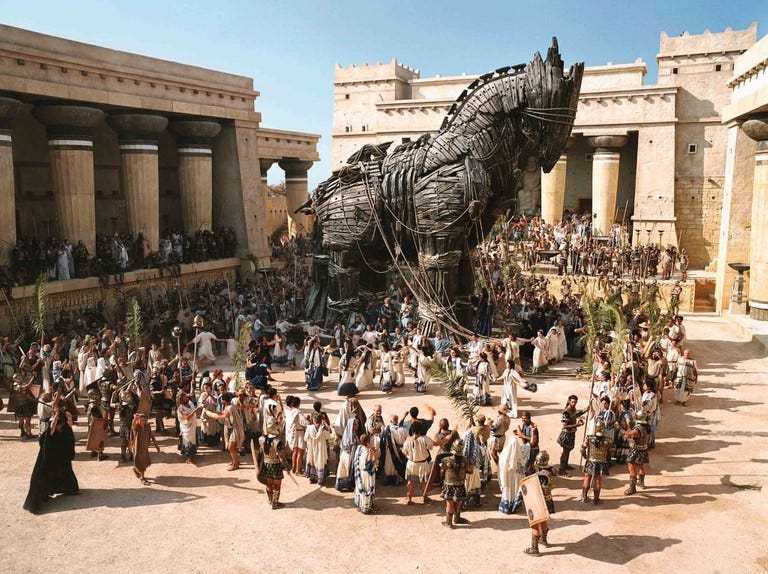War (part 2): the making and unmaking of man
When the engine of human progress has nothing left to give
Note: Conclusion of a two-part series. Part 1 is here.
Swift-footed Achilles may have sought and achieved individual glory, but in the Iliad his deeds of violence and valor came during a massive Bronze-Age world war that spanned the Aegean and drew warriors from as far afield as Ethiopia. The Homeric epics recounting his exploits mix the rustic culture of the Greek Dark Age, between 1100 and 800 BC, when the region was dominated by barbaric tribes, with the prior grand citadel culture of the Bronze-Age Mycenaeans, who ranged from Sicily to Syria. Though the Iliad may center the action around individual duels between heroic kings and princes, Homer does provide a broader accounting of the armies that clashed on the plains of Ilios. He asserts that 46 captains and a total of 1,186 ships sailed to Troy. Assuming a bit over 100 men per vessel suggests over 100,000 men. This seems implausible for this period and a figure more in line with modern wars, and we can probably attribute it to Dark-Age epic poets’ imaginative exaggeration (it also seems unlikely that the rulers of Ethiopia sent armies 3,500 miles to the north, especially since the first kingdom in that part of the world dates to after the Bronze Age). In the ancient world, hyperbolic round quantities like 100,000 routinely described armies to connote “very, very big.”
And yet, however imprecise or exaggerated, these intimations of mass mobilizations get at an important dimension of the ancient world; the late Bronze-Age civilizations of Egypt, Hittite Anatolia, and Babylonia were states where kings and generals marched into battle leading formations of thousands of men executing standard maneuvers. In Homer’s telling, during the Trojan War, these vast armies fought under leaders who could dart across the battlefield in chariots, which is also what we see in Egyptian records of their wars with the Hittites in Syria 3,250 years ago. These Bronze-Age conflicts were the clashes of states, and they dictated the rise and fall of kingdoms. They were not simply tribal skirmishes over stolen cattle or other personal disputes over kidnapped queens.
But the world of the Odyssey and Iliad also recalls the more primal modality of warfare, of heroes accruing glory and achieving fame in individual combat and feats of daring. Recall that Chagnon (our researcher in the Amazon from part 1) claims Yąnomamö warriors gain evolutionary advantage from battle prowess, their display of martial fitness presumably signaling their genetic fitness to potential mates. This interpretation may seem reductive, but the Iliad begins with Agamemnon taking possession of Achilles’ concubine Briseis, whom Achilles acquired after killing her husband and sacking her city. This duality between the broader cultural and political context of war, and the opportunity that it presented for heroic reputation-building on an individual level persists down to the modern era, even if the ethical revolution of the Axial Age transformed the mandate of the warrior caste from bare amoral self-aggrandizement to knightly protection of the weak and innocent. In the modern era, figures as disparate as Teddy Roosevelt, Winston Churchill and John McCain achieved individual honor and discovered their calling as leaders even in the bloody maw of mechanized mass warfare.
For Glory and Greatness
The casus belli for the Trojan War, the Trojan prince Paris’ abduction of Helen, King Menelaus of Sparta’s legendarily beautiful wife, is clearly something that evolutionary psychologists would recognize as explicable in the framework of their theories (king Priam of Troy had 18 sons and 68 daughters by many wives). But this was likely a romantic narrative flourish added by the ancient bards. History teaches that the pretext for war is often an excuse, prettily masking the true motive. Over 2,000 years ago, Caesar attacked the Gauls in an unprovoked manner after failing to goad a desperate mass of migratory men, women and children into violating Roman borders as they fled their homeland. He wanted his war, and he got it.




